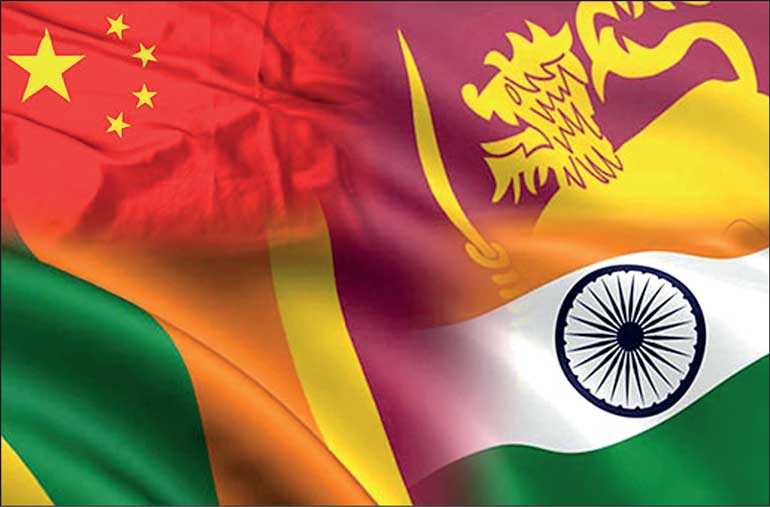Thursday Feb 19, 2026
Thursday Feb 19, 2026
Thursday, 6 August 2020 00:00 - - {{hitsCtrl.values.hits}}

China’s nature and approach of dealing with small island nations has benefits as well as serious challenges in the long run. However, for India safeguarding the territorial integrity in the South Asian region as well as in small island states like Sri Lanka should be of primacy
Interdependence and bandwagoning has been central to the new foreign policy dynamics of smaller states in the recent years. In the 21st century, the power matrix between bigger and smaller nations will  be determined by this paradigm.
be determined by this paradigm.
Sri Lanka’s foreign policy as an island nation should be to promote its national interest in synchrony with mainland India without compromising its relations with other major nations. For stabilisation of the Indo-pacific region, these small strategically located islands are of manifold importance to major countries. However, China’s growing influence in these small island nations such as Sri Lanka and Maldives has been a major impediment to India’s security interest. These influences are in terms of large investments changing the socio-political dynamics of the island, impacting the domestic interest and shaping of external policy. Taking into account the influence of China in Sri Lanka, it is important to reassess Sri Lanka’s foreign policy direction with its growing relevance for both India and China.
This analysis attempts to demystify Sri Lanka’s new foreign policy direction in the light of its growing significance for the Asian giants like India and China.
The India-China factor in Sri Lanka
Since the end of Sri Lankan conflict in 2009, post-war reconstruction made it vital for Sri Lanka to take a detour from its previous foreign policy norms. This major departure from its prior neutral stance was intended to provide momentum for its economic development and stabilisation. At this juncture, China’s entry into Sri Lanka under the Belt and Road Initiative (BRI) via large investments in multi-dimensional mega projects was significant for its stabilisation. However, in the same period India’s pragmatic economic diplomacy together with its aid diplomacy especially in the North Eastern Provinces balanced China’s influence in the region. India’s regional interest with its southern island nations has been growing in the recent past. Trade diplomacy and maritime security is the prime focus of India’s relation with Sri Lanka. Looking from a regional perspective, Sri Lanka as a small nation needs India to further its strategic interest. India being the largest nation in the region sees Sri Lanka of manifold importance for its geo-political and trade interest and in promoting Neighbourhood First Policy and SAGAR doctrine. There is also an ethno-religious aspect to this affiliation. These ethno-religious factors directly influence the domestic politics in Sri Lanka which in turn manifests in the form of external policies that are in tandem with India.
The Indian approach
In 1927, Mahatma Gandhi during his visit to Sri Lanka referred to the island nation as India’s daughter state. This remark emphasises the paramount significance that India has for Sri Lanka since antecedence. The evolving geo-political concerns in South Asian region has prompted India to forge a deeper commitment with Sri Lanka.
To strengthen this relationship, India has taken a multi- faceted approach with trade and aid diplomacy being an eminent part of it. However, the Chinese influence in Sri Lanka through Belt and Road Initiative has been a challenge for India in the recent times. In order to counterbalance this, India has taken certain solid steps to strengthen this enduring relationship.
For India, Sri Lanka will be a vital island partner that India can easily develop its relationship to maintain the balance of power in this region. However, the lack of political will in the domestic sphere has been a hindrance in pursuing stronger ties. For India to strengthen its neighbourly relations, it should take into close consideration the domestic matters when framing its foreign policy agenda on Sri Lanka.
Chinese pursuit in Sri Lanka
With Indian Ocean Region (IOR) becoming central for maritime trade and energy supply routes, China’s status as a rising superpower requires it to expand its national interests beyond its borders. In this regard, the geo-strategic positioning of Sri Lanka in the Indian Ocean has become immensely relevant for implementing China’s Belt and Road Initiative (BRI).
China’s diplomatic endeavours in Sri Lanka amounting to $ 11 billion in the form of investments created massive job opportunities for the islanders, directly influencing the politics and policy of the country. Despite these developmental gains, heavy borrowing from China comes with its own problems impinging on Sri Lanka’s development agenda.
For instance, Chinese loans comprises 10% of Sri Lanka’s $ 55 billion external debt obligations. Further, loans from China may plunge Sri Lanka into a debt trap. In this regard, India’s far sighted reach towards Sri Lanka in the form of soft loans and currency swaps brings about economic security to the island nation.
Sri Lanka’s geo-political significance for India and China
China’s nature and approach of dealing with small island nations has benefits as well as serious challenges in the long run. However, for India safeguarding the territorial integrity in the South Asian region as well as in small island states like Sri Lanka should be of primacy.
Mutual trust based on historic and ethno-religious grounds along with political and economic determinants forms the cornerstone of this bilateral bond. China’s modus operandi in the South Asian region reflects its vested economic interests.
Historically, India has stood by the island nation during its time of need and today it still abides by this policy by being a reliable partner and by easing the island nation’s economic burden. Therefore, Sri Lanka considers India as its most trusted and closest external partner which guarantees it with security and progress.
[Dr. Srimal Fernando, a recipient of the prestigious O.P Jindal Doctoral Fellowship and the SAU Scholarship under the SAARC umbrella. He is an Advisor/Global Editor of Diplomatic Society for South Africa in partnership with Diplomatic World Institute (Brussels).He is also the winner of the 2018/2019 Best Journalist of the Year award in South Africa, and has been the recipient of Global Communication Association (GCA) Media Award for 2016.]
[Prinssa Joby is pursuing Master of Arts (MA) in International Studies at Christ University in Bangalore. She completed her Bachelor of Arts (BA) in Global Affairs at Jindal School of International Affairs. She was also the recipient of Savitri Jindal scholarship and was a member of the Centre for European Studies at the O.P Jindal Global University, India.]